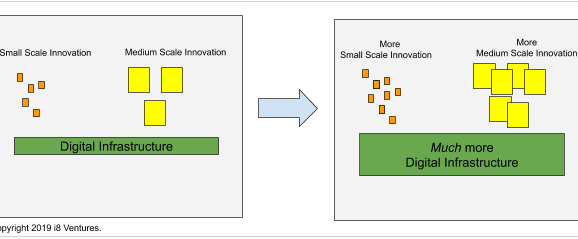More Innovation Calls for Much More Digital Infrastructure

In the above chart, we depict how both more “small-scale innovation” (AKA incremental innovation ala ) and more “medium-scale innovation” (AKA process innovation ala Michael Hammer) calls for much more digital infrastructure. (Note that for simplicity we did not include the third level of large-scale innovation, which of course calls for much stronger digital infrastructure).
To elaborate, organizations see their competitors (both current and new) adopting new digital business models; their leaders realize that they must innovate to keep pace. Think, for example, about a traditional brick and mortar chain like CVS threatened by the entry of new player (Amazon) to their market
In many cases, digital is the external force that is pushing companies to innovate, and at the same time, digital is the force that allows organizations to initiate, groom and scale their innovation.
Digital is both friend and foe. Creating a strong digital infrastructure enables a company to innovate at a faster pace. In a way, digital innovation at its core is a meta-innovative process that enhances the digital infrastructure and thus allows other forms of innovation.
How might this work? Consider a company which is looking to innovate in the way it interacts with its customers. A manager proposes using a new Customer Relationship Management (CRM) software.
At a company that has a weak digital infrastructure, such a move could take months. Yet in a company with a strong digital culture and ability, where employees see the opportunity, are ready for change, and have adopted digital technologies in the past, this change can happen in days. In fact, an initial CRM system can be implemented overnight with cloud-based tools, that is fed by an already organized excel based data.
Companies too often see the digital force as a threat rather than an opportunity. Yet to thrive, companies must embrace digital — a simple attempt to “innovate” without it will not suffice.
Digital technology has become a critical part of an organization’s ability to create a competitive advantage. Therefore, the right way to relate to digital technology is as a strategic investment. Management must use digital technology to reinvent and re-imagine their organization.
The bottom line: To enhance your innovation cycle (initiate, groom, and scale), enhance your digital infrastructure.
